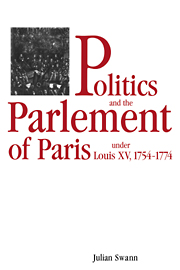Book contents
- Frontmatter
- Contents
- Dedication
- Preface
- List of abbreviations
- 1 Introduction: the Parlement of Paris
- 2 Historians and the parlements
- 3 The king and his judges
- 4 The parti janséniste and the refusal of the sacraments crisis, 1754–1756
- 5 Managing the parlements: crisis and compromise, 1756–1758
- 6 The Parlement and fiscal politics, 1756–1763
- 7 Choiseul and the politics of appeasement, 1758–1763
- 8 An unhappy peace, 1763
- 9 Defending La Chalotais: the Brittany affair, 1764–1766
- 10 In the eye of the storm, 1767–1770
- 11 The fall of the Parlement of Paris, 1770–1771
- 12 Conclusion: Maupeou and beyond
- Bibliography
- Index
6 - The Parlement and fiscal politics, 1756–1763
Published online by Cambridge University Press: 13 March 2010
- Frontmatter
- Contents
- Dedication
- Preface
- List of abbreviations
- 1 Introduction: the Parlement of Paris
- 2 Historians and the parlements
- 3 The king and his judges
- 4 The parti janséniste and the refusal of the sacraments crisis, 1754–1756
- 5 Managing the parlements: crisis and compromise, 1756–1758
- 6 The Parlement and fiscal politics, 1756–1763
- 7 Choiseul and the politics of appeasement, 1758–1763
- 8 An unhappy peace, 1763
- 9 Defending La Chalotais: the Brittany affair, 1764–1766
- 10 In the eye of the storm, 1767–1770
- 11 The fall of the Parlement of Paris, 1770–1771
- 12 Conclusion: Maupeou and beyond
- Bibliography
- Index
Summary
Historians have been almost unanimous in describing the period after 1750 as one of mounting parlementaire opposition to the fiscal policies of Louis XV. Following the outbreak of the Seven Years War in the summer of 1756, the resistance of the magistrates allegedly intensified as the crown resorted to increased taxation, loans, and a host of other expedients to meet the costs of an expensive and ultimately disastrous war. By 1759 the situation had become so desperate that the royal silver had to be sent to the mint, an act which brought back memories of the terrible final years of Louis XIV's reign. For some scholars, the conduct of the Parlement in these circumstances has been seen as the selfish, even unpatriotic, reaction of an institution committed to the defence of its own fiscal privileges. Even those sympathetic to the motives of the judges have concurred with the idea of increasing militancy, attributing their behaviour to the desire to defend individual or provincial interests against a financially rapacious administration. Despite the conflicting nature of these two interpretations, they are both in harmony with the traditional picture of parlementaire politics under Louis XV, which assumes a rising tide of opposition eventually checked by the reforms of Maupeou. There is more than a grain of truth in such an analysis. After 1756, there was more conflict about fiscal matters than at any time since the ministry of John Law, if not the frondes, and in the provinces matters were, if anything, worse.
- Type
- Chapter
- Information
- Politics and the Parlement of Paris under Louis XV, 1754–1774 , pp. 156 - 192Publisher: Cambridge University PressPrint publication year: 1995



